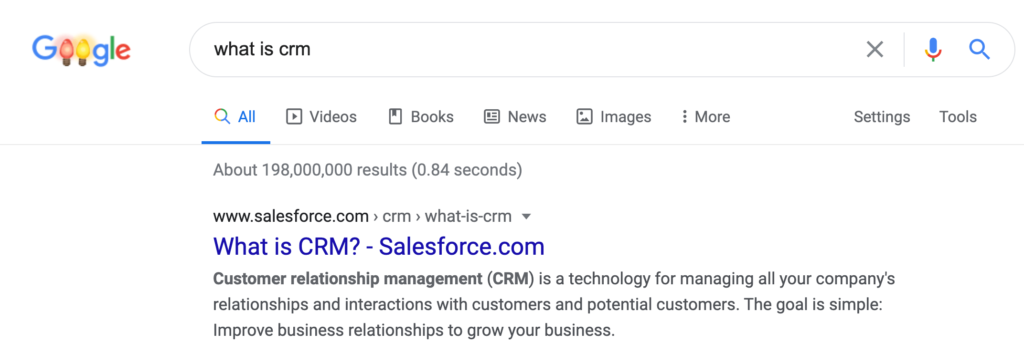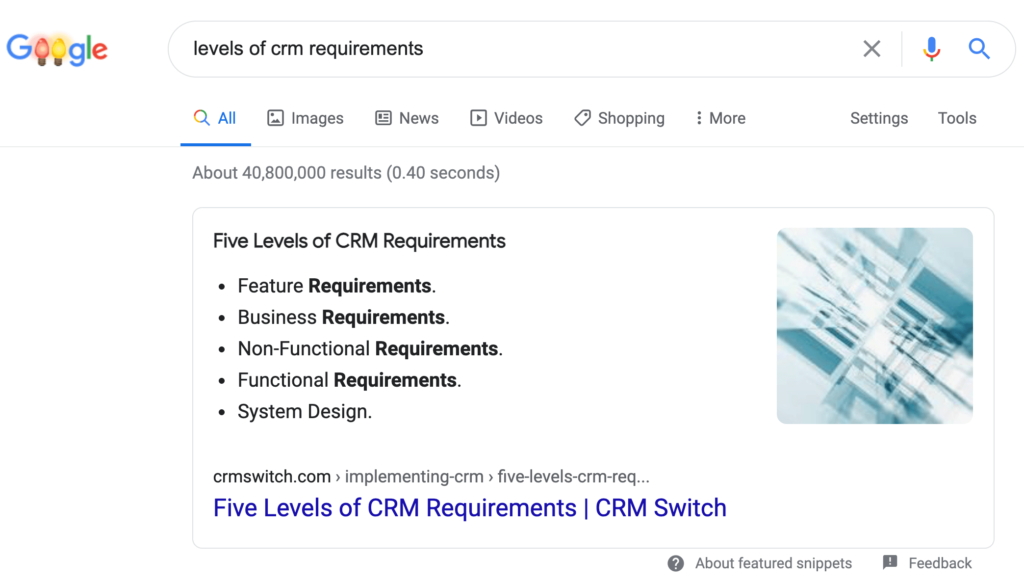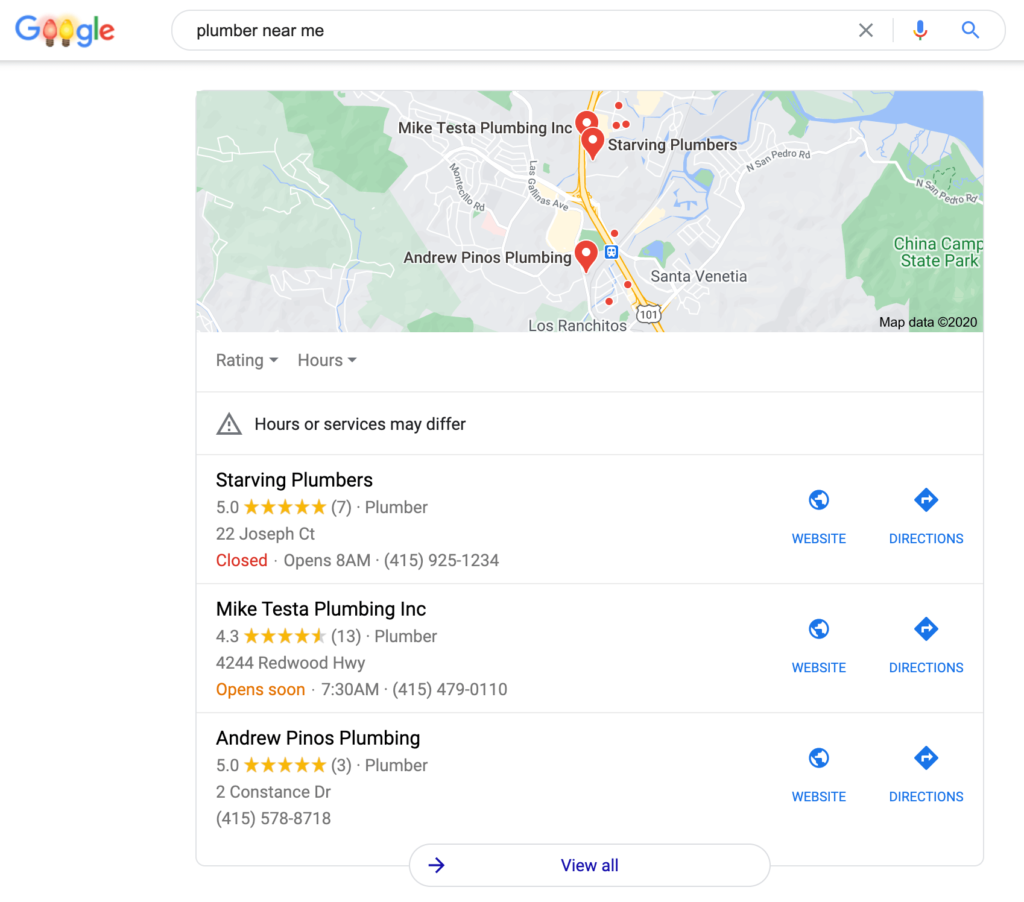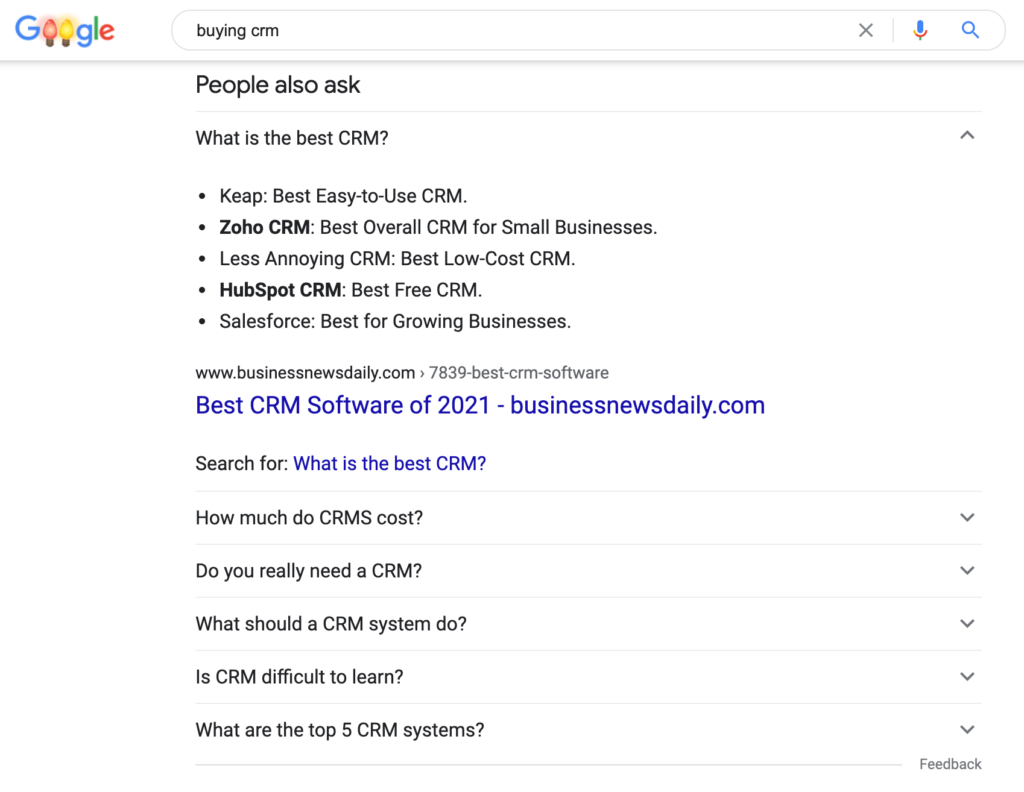What is ‘organic search’?
Since no one technically performs an organic search, the better question is, “What is an organic search result?”
The business adaptation of the word ‘organic’ is “characterized by continuous or natural development.”
A company, for example, can grow organically by selling more of what it has and creating more to sell. It can also grow by making acquisitions, paying to grow more quickly.
In online search, ‘organic’ is used to differentiate unpaid search results from paid results (we’ll focus on Google search results from this point forward since Google is currently the dominant search engine).
Incidentally, organic search results are only possible because of paid search results.
Conversely, ads are most effective when they’re on the same page as organic results. If Google displayed only paid ads in search results, those ads would not get nearly as much visibility.
Otherwise stated, Google would not have earned $48 billion in search revenue in Q4 2023 without the organic part.
Invoking organic search results
To view organic results, type a query into the Google search bar, hit the return key, or click/tap the magnifying glass (it gets less evident from here).
The results for the query consist of information that Google extracts from online content that it knows about. This content can include text, images, and video.
How does Google know about specific content? Googlebot constantly crawls the web, looking for new and updated pages, images, videos, and more. Google adds to and updates its extensive index of web pages.
A common form of extraction and presentation is familiar to all of us. A query plus a chunk of extracted information looks like this:

The results’ key elements are a clickable (or tapable) title and a short snippet of text from a larger body of text.
Organic search results are fluid. The questions of which results are presented on the page and in what order are in constant flux. Organic results often vary by the location of the person who enters the query.
TIP
If you are logged into a Google account in your browser window, some of the results you see may be specific to you.
Enter your query in an incognito or private browser window to remove much of what Google knows about you as a factor.
Organic results are not entirely natural, even though Google’s algorithm is deliberate about what someone presents on the page.
However, ‘organic search results’ is a more euphemistic term than ‘non-paid search results’—so it’s as good a term as any.
Often, content that is discovered, extracted, and presented was done without the content creator’s intention for it to be found and displayed by a search engine.
If someone is offended by seeing a reference to their content in the organic search results, they can tell Google and other search engines to stop displaying it. This is done by adding some code to their page that tells search engines, “Do not add this to your index.”
On the other hand, if a content creator wants their content to be found, they can take deliberate steps to get their content extracted and presented in the search results. This practice is part of a content marketing strategy.
Part of inbound marketing involves creating content to have pieces of the content extracted and presented in the search results, along with a link to the full content.
The link drives new and repeat visitors (what Google Analytics calls ‘users’) to your site.
How does Google decide what to display?
Google has a sophisticated algorithm that decides what organic search results to display for a given query.
What is displayed generally depends on the relevance of the search result to your query and on the domain’s authority (company-name.com) that hosts the content.
Authority is determined by several factors, including the longevity of the domain and the quantity of content. Even more important is the objective quality of a website’s content. In other words, I can write what I believe to be a lot of beneficial content, but it doesn’t matter what I believe. Others have to find it helpful.
Others effectively vote for the quality of a website’s content in several ways. One way is by how much time they spend reading or staring at content.
But the strongest ‘yes’ vote for the quality of your content is when someone links to it from their content—particularly if their domain has high authority. This link is called a backlink.
Let’s look at another #1 organic search result.
If you type ‘what is crm’ or just ‘crm’ into the Google search bar, the #1 or #2 organic search result you will likely see is a reference to this article on the Salesforce.com website.
Google’s algorithm has deemed this one of the best answers to your query.

According to Ahrefs.com, over 32,000 people per month in the U.S. find and visit this page through organic search.
Ahrefs estimates that Salesforce would have to spend $147,800 monthly for pay-per-click advertising to get the equivalent traffic that this page gets organically. This is a dramatic example of why many businesses should try to get at least some of their content to rank high in the search results.

To determine relevance, Google associates your query with the words on a page. Google applies natural language understanding to words.
Google’s AI tries to find contextual meaning on a page rather than simply analyzing the page for individual keywords. It does this by applying the concept of entities. For example, in the proper context:
- ‘customer’ is a person
- ‘competitor’ is an organization
- ‘san francisco’ is a location
- ‘desktop computer’ is a consumer good
- ‘$799’ is a price
You can paste the text from one of your web pages into the box on this page and click the Analyze button to understand how Google’s natural language engine interprets your content.
Other types of organic search results
Let’s refer to the above results as ‘organic listings’ since we believe other non-paid results qualify as ‘organic,’ although they’re not generally referred to as such.
Featured Snippets
A featured snippet is a richer extraction of content than a listing. The snippet appears at the top of the search results. Here’s an example of a list. Other forms of featured snippets include tables and steps (such as recipes).

We won’t get into all the details of featured snippets, but you can learn more in this excellent article by Backlinko.
Local Pack
If you search for a local product or service, you will usually see a Local Pack somewhere on the page.

The prerequisite for a business showing up in the Local Pack is that it has a Google Business Profile (GBP) page. Google automatically creates GBP pages for almost all local and non-local businesses.
The brief advice here is to beef up your GBP page with reviews, posts, pictures, videos, products, services, and more.
People also ask
People also ask (PAA) is Google’s way of using the search query to form relevant questions and extract answers from the web pages in its index.

Once again, we won’t get into the details. But here’s a schooling on PAA from Joshua Hardwick of Ahrefs.
The elephant in the room
That is, organic listings have been increasingly crowded out by ads and other organic elements such as the ones above—to the point that for many queries, organic listings are “below the fold.” In other words, you have to scroll down the results page to see them.
Does this mean you shouldn’t try to get your content to rank high in the organic search results?
Salesforce has given us 32,000 reasons (a month) with a single article about why you should still try to get some of your content to rank.
Because of the crowding out of listings, it’s generally better to focus on content that will rank for queries that don’t trigger as many different search engine results.
Writing about niche topics and optimizing your content for longer tail keywords & more Google entities are approaches to consider.



